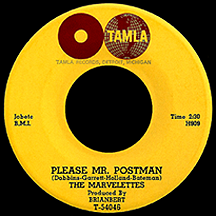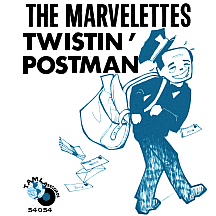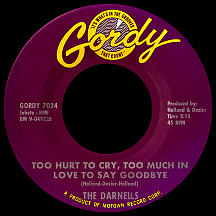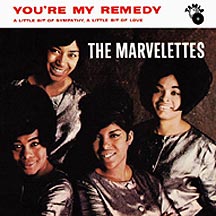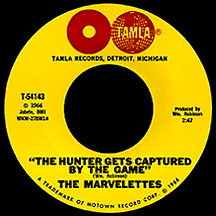THE MARVELETTES
The Marvelettes were a big part of all the excitement. From the early days of Motown through the end of its first and best decade, this group from the Detroit suburb of Inkster, Michigan delivered a steady stream of hit records noted for strong lead vocals by two of Hitsville U.S.A.'s best, though sometimes overlooked, singers, Gladys Horton and Wanda Young. Those two in particular would bring the goods, time and again, hitting the "sweet spot" that sometimes made them more compelling than the bigger Motown acts.
It all started around 1960 when Horton and aspiring songwriter Georgia Dobbins set out to put together a high school girl group. The Shirelles were red-hot at the time, and the two close friends had caught the bug...what did it matter if they couldn't sing? Ambition and drive would get them 90 percent of the way there. Georgeanna Tillman, Katherine Anderson and Juanita Cowart threw in with them, and the five called themselves The Casinyets (as in "Can't Sing Yet"). They quickly discovered they could sing, and very well at that.
In the spring of 1961, while The Miracles' "Shop Around," the first big Tamla label hit, was still on the charts, the girls auditioned successfully for the label using the name The Marvels, resulting in Brian Holland and Robert Bateman producing their first record under the pseudonym "Brianbert." Bossman Berry Gordy suggested a name change to the more female-sounding Marvelettes. Dobbins and pianist William Garrett came up with "Please Mr. Postman" (with lyrics like 'deliver de letter de sooner de better,' a good fit for Gladys's brassy vocal style). Parental disapproval prevented Georgia from remaining; one has to wonder how differently the group's career might have progressed had she stayed. Yet Wanda, her replacement, developed into such a dynamic vocalist it would seem the switch was key to the long-term success of the group.
The record got off to a slow start on the charts in September, took a slight but disheartening drop a month later, then rebounded into the top 40, overcoming yet another backwards bump before getting to the top ten. Finally, in December 1961, "Please Mr. Postman" went where even Bill "Smokey" Robinson and his Miracles had not: number one on the pop charts, a first for the fledgling company. The 'lettes were Gordy's pets after that, though I have to question the wisdom of releasing "Twistin' Postman" as the follow-up...quickie sequels of that type have often stalled an artist's career. In this case, talent and the newfound clout Motown had with record distributors (not unusual when coming off a number one hit) kept things on track. They were back in the top ten in June 1962 with "Playboy" and the hit streak continued in the fall with "Beechwood 4-5789," perhaps the most famous phone number in rock music history.
The whole gang at Hitsville headquarters came up with songs for the Marvelettes, including Mickey Stevenson, Marvin Gaye, Holland, Lamont Dozier and Freddie Gorman (those last three responsible for one of my favorites by the group, "Strange I Know"). Smokey put in his two cents with "He's a Good Guy (Yes He Is)" and "You're My Remedy," yet in 1963 the group went into a slump, both creatively and commercially. The act began to splinter; Juanita Cowart left due to medical issues. Romantic entanglements among label staff led to the marriages of Wanda Young (to the Miracles' Bobby Rogers) and Georgianna Tillman (to Billy Gordon of The Contours).
Single releases weren't catching on like before, and suddenly there was in-house competition from Martha and the Vandellas and The Supremes, both starting to break into the top 40 at that time. An experimental release using the name The Darnells, "Too Hurt to Cry, Too Much in Love to Say Goodbye" failed to hit, but remains a curiosity. The Marvelettes' actual input at the session has been questioned, and at least partial vocals from Motown backing group The Andantes is a likelihood. The entire Darnells project seems to have been a sort of goulash stew where contributions came from whoever happened to wander into the studio that day. The flip, "Come On Home," is one of those strange group efforts that sounds unrehearsed: mostly an instrumental, what vocals are heard are by male singers, possibly members of The Temptations and Contours, Eddie Holland and others.
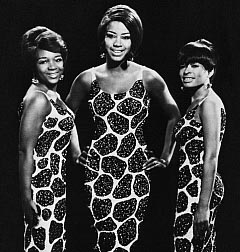
Down to four members in 1964, they got back on track with the Eddie Holland-Norman Whitfield song "Too Many Fish in the Sea," advising women to not just settle for the first guy that comes along (much like the Miracles' mom had recommended in "Shop Around"). It was a hit late in 1964, and the start of a newfound momentum for three members at least, as health problems soon forced Georgeanna Tillman to quit. The girls continued with Anderson backing two lead singers, Horton and Young. In fact, this pared-down version of the group, with Wanda taking most of the lead vocals starting with "I'll Keep Holding On," returned them to the heights of the original lineup's first two years. Smokey's (autobiographical?) "Don't Mess With Bill" went top ten in March 1966 (for the first time since "Playboy" nearly four years earlier) and he penned several follow-up hits, including "You're the One," 1967 career highlight "The Hunter Gets Captured by the Game," "My Baby Must Be a Magician" ('...'cause he's sure got the magic touch') featuring Melvin Franklin of The Temptations as the illusionist-of-love, and "Here I Am Baby," all with Wanda's appealingly sultry lead vocals.
Van McCoy's "When You're Young and in Love" (a minor hit a few years earlier by Ruby and the Romantics) was one of the group's 1967 hits, and the following year Ashford and Simpson contributed to the Marvelettes' stockpile with "Destination: Anywhere." Around this time Gladys Horton married and left the group (replaced by Anne Young for a short time). By the start of the 1970s, Wanda Young was the only one left; the other members had each moved on to new chapters of their lives. Motown made solo recordings with Young, releasing these one-woman-group efforts under The Marvelettes' name for the next year or so. She left Motown in 1972 at about the same time Gordy was moving the operation from Detroit to Los Angeles. Similar to the story of Ten Little Indians, they had started with five and gradually worked their way to one, then none. But Motown's first girl group, the marvelous Marvelettes, claimed a unique place in music history along the way.
NOTABLE SINGLES:
- Please Mr. Postman /
So Long Baby - 1961 - Twistin' Postman - 1962
- Playboy - 1962
- Beechwood 4-5789 /
Someday, Someway - 1962 - Strange I Know /
Too Strong to Be Strung Along - 1963 - Locking Up My Heart /
Forever - 1963 - My Daddy Knows Best - 1963
- As Long As I Know He's Mine - 1963
- Too Hurt to Cry, Too Much in Love to Say Goodbye - 1963
as the Darnells - He's a Good Guy (Yes He Is) - 1964
- You're My Remedy - 1964
- Too Many Fish in the Sea - 1964
- I'll Keep Holding On - 1965
- Danger Heartbreak Dead Ahead - 1965
- Don't Mess With Bill - 1966
- You're the One - 1966
- The Hunter Gets Captured by the Game - 1967
- When You're Young and in Love - 1967
- My Baby Must Be a Magician - 1968
- Here I Am Baby - 1968
- What's Easy For Two is Hard For One /
Destination: Anywhere - 1968 - I'm Gonna Hold On As Long As I Can - 1969
- That's How Heartaches Are Made - 1969


